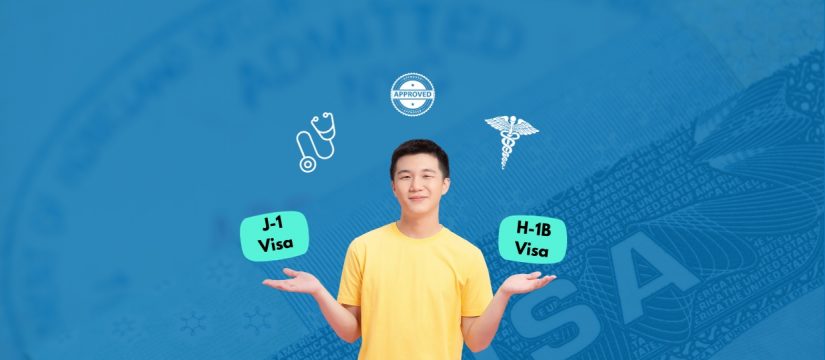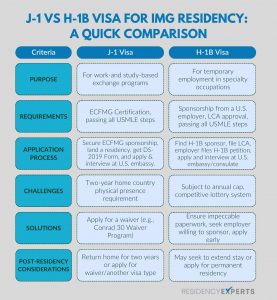
The journey to residency in the United States is a challenging one for International Medical Graduates (IMGs), with the visa application process being one of the most daunting obstacles. A critical step for IMGs, understanding the nuances of securing a visa for IMG residency is essential for a smooth transition and successful integration into the U.S. healthcare system. The type of visa you choose not only influences the course of your training but also shapes your future career prospects in the U.S., making informed decisions in this process all the more vital.

The J-1 Visa: A Common Pathway for IMG Residency
The J-1 visa is a non-immigrant visa catering to individuals participating in work-and study-based exchange visitor programs. It’s a popular choice among IMGs for U.S. residency, but the application process involves several detailed steps:
- Eligibility Assessment: The first step is to ensure that you meet the eligibility criteria for the J-1 visa. This includes having a valid ECFMG certification, which in turn requires passing all United States Medical Licensing Examination (USMLE) steps.
- Obtaining ECFMG Sponsorship: The ECFMG acts as the visa sponsor for IMGs on a J-1 visa. You must apply for ECFMG sponsorship, which involves submitting your USMLE scores, medical school transcripts, and other documentation.
- Securing a Residency Position: You need to secure a position in a residency program that accepts J-1 visa holders. This typically involves going through the Match process.
- DS-2019 Form: Once you have a residency position and ECFMG sponsorship, you will receive a Form DS-2019, which is required to apply for the J-1 visa.
- Visa Application and Interview: With the DS-2019 form, you can apply for the J-1 visa at a U.S. embassy or consulate in your home country. This process includes submitting a visa application, paying the visa fee, and attending an interview.
J-1 Visa Challenges and Solutions
The J-1 visa, popular among IMGs for U.S. residency, is tailored for those in work-and study-based exchange visitor programs. However, it comes with specific challenges:
1. Two-Year Home Country Physical Presence Requirement: Post-residency, J-1 visa holders must return to their home country for two years. This can disrupt career plans or family life in the U.S.
Solution: Applicants may apply for a waiver of this requirement under certain circumstances, such as the Conrad 30 Waiver Program, which allows IMGs to work in medically underserved areas in the U.S.
2. ECFMG Sponsorship and Licensing Requirements: Obtaining a J-1 visa necessitates sponsorship from the ECFMG, which requires passing all the United States Medical Licensing Examination (USMLE) steps and fulfilling other specific educational criteria.
Solution: Applicants should ensure they fully understand and meet all ECFMG requirements and maintain open communication with the commission throughout their application process.
The H-1B Visa: An Alternative Route for IMG Residency
The H-1B visa is a temporary employment visa for specialty occupations, including medical residencies. The application process is more complex and involves the following steps:
- Finding an H-1B Sponsor: The first challenge is to secure a residency program that is willing and able to sponsor an H-1B visa. Not all programs offer this sponsorship.
- Labor Condition Application (LCA): Your sponsoring employer must file an LCA with the U.S. Department of Labor, attesting to various conditions, including wage obligations and working conditions.
- H-1B Visa Petition: Once the LCA is approved, your employer must file an H-1B petition on your behalf with U.S. Citizenship and Immigration Services (USCIS). This includes submitting detailed information about your qualifications and the residency position.
- Cap and Lottery System: H-1B visas are subject to an annual cap and a lottery system. If the number of petitions exceeds the cap, a random lottery is used to select the petitions that will be processed.
- Visa Application and Interview: If your petition is selected and approved, you can then apply for the H-1B visa at a U.S. embassy or consulate. This involves another set of applications, fees, and an interview.
- Maintaining Visa Status: It’s crucial to maintain your H-1B status throughout your residency, which means adhering to the terms of your employment and visa conditions.
H-1B Visa Challenges and Solutions
The H-1B visa, another pathway for IMGs, is typically used by employers to hire foreign workers for specialty occupations. It presents its own set of challenges:
1. Limited Number and Competitive Nature: The H-1B visa is subject to annual caps, and the demand often exceeds the available number of visas, leading to a lottery system.
Solution: Applicants should ensure their paperwork is impeccable to avoid delays or rejections. Working with an experienced immigration attorney can also help navigate this competitive process.
2. Dependency on Employer Sponsorship: Unlike the J-1 visa, the H-1B requires sponsorship from a U.S. employer, which can be a limiting factor for many IMGs.
Solution: IMGs should focus on building strong professional relationships and networks within the U.S. medical community. Attending job fairs, networking events, and reaching out to potential employers can increase the chances of securing sponsorship.
3. Complex Application Process: The H-1B visa process is often seen as more complex and cumbersome compared to the J-1 visa.
Solution: Thorough preparation and early application are key. Again, seeking assistance from immigration professionals who specialize in medical residency can provide invaluable guidance.
Both the J-1 and H-1B visas offer pathways for IMGs to pursue residency in the U.S., but each has its own set of procedures and considerations. By understanding the nuances of each visa type, IMGs can better prepare for the challenges ahead and select the option that best aligns with their professional goals and personal circumstances.
Visa for IMG Residency: Weighing Your Options
Choosing between the J-1 and H-1B visas involves considering various factors. The J-1 visa may be easier to obtain and more flexible for residency purposes, but it comes with a two-year home residency requirement. The H-1B, while offering a pathway to longer-term employment and residency in the U.S., is subject to caps and can be competitive.
Preparing for the Visa Application Process
The visa application process involves extensive documentation, including proof of medical qualifications, ECFMG certification, and financial stability. Preparing thoroughly for the visa interview is crucial, presenting a clear and honest case for your intent to train in the U.S.
Challenges and Solutions in Securing a Visa
IMGs often face challenges such as navigating the legal complexities of visa applications and handling the uncertainty of visa lotteries. Seeking advice from immigration lawyers, mentors, and peers who have successfully navigated the process can be incredibly beneficial.
Post-Residency Visa Considerations
Upon completing residency, visa holders must consider their next steps. J-1 visa holders might seek a waiver of the two-year home residency requirement or transition to another visa type for further training or work. H-1B visa holders may explore options for extending their stay or applying for permanent residency.
Conclusion
Navigating the visa application process for IMG residency is a complex but manageable journey. By understanding the options and preparing meticulously, IMGs can successfully overcome these hurdles. The effort invested in this process is a significant step towards achieving your dream of practicing medicine in the United States.
Additional Resources
For further assistance, IMGs can explore resources provided by the ECFMG, the Association of American Medical Colleges, and various online forums dedicated to IMGs pursuing residency in the U.S.
ECFMG – Types of Visas: ECFMG Visa InformationAmerican Medical Association – IMG Toolkit on Types of Visas: AMA IMG ToolkitMatch A Resident – Information for Non-US IMGs: Match A Resident for IMGs
If you need professional advice on visa sponsorship options, don’t hesitate to contact Residency Experts at (858)-221-8590 or via email at support@residencyexperts.com. We are committed to supporting you at every stage of your journey to ensure your success!
